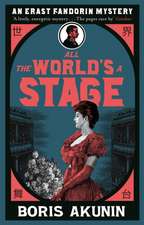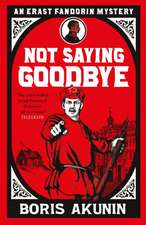Special Assignments: The Further Adventures of Erast Fandorin: Erast Fandorin Mysteries (Paperback)
Autor Boris Akunin Traducere de Andrew Bromfielden Limba Engleză Paperback – 29 feb 2008
Peopled by a rich cast of eccentric characters, and with plots that are as surprising as they are inventive, Special Assignments will delight Akunin’s many fans, while challenging the gentleman sleuth’s brilliant powers of detection.
Praise from England:
“Boris Akunin’s wit and invention are a source of constant wonder.”
–Evening Standard
“[Fandorin is] a debonair combo of Sherlock Holmes, D’Artagnan and most of the soulful heroes of Russian literature. . . . This pair of perfectly balanced stories permit the character of Fandorin to grow.”
–The Sunday Telegraph
“Agatha Christie meets James Bond: [Akunin’s] plots are intricate and tantalizing. . . . [These stories] are unputdownable and great fun.”
–Sunday Express
“The beguiling, super-brainy, sexy, unpredictable Fandorin is a creation like no other in crime fiction.”
–The Times
Preț: 87.84 lei
Nou
Puncte Express: 132
Preț estimativ în valută:
16.81€ • 17.49$ • 13.88£
16.81€ • 17.49$ • 13.88£
Carte indisponibilă temporar
Doresc să fiu notificat când acest titlu va fi disponibil:
Se trimite...
Preluare comenzi: 021 569.72.76
Specificații
ISBN-13: 9780812978605
ISBN-10: 0812978609
Pagini: 335
Dimensiuni: 134 x 203 x 20 mm
Greutate: 0.26 kg
Editura: Random House Trade
Seria Erast Fandorin Mysteries (Paperback)
ISBN-10: 0812978609
Pagini: 335
Dimensiuni: 134 x 203 x 20 mm
Greutate: 0.26 kg
Editura: Random House Trade
Seria Erast Fandorin Mysteries (Paperback)
Notă biografică
BORIS AKUNIN is the pen name of Grigory Chkhartishvili, who was born in the Republic of Georgia in 1956. A philologist, critic, essayist, and translator of Japanese, Akunin published his first detective stories in 1998 and has already become one of the most widely read authors in Russia. He is the author of eleven Erast Fandorin novels, including The Winter Queen, The Turkish Gambit, Murder on the Leviathan, The Death of Achilles, and Special Assignments available from Random House Trade Paperbacks; and Sister Pelagia and the White Bulldog and Sister Pelagia and the Black Monk, in the Sister Pelagia series. He lives in Moscow.
Extras
Chapter 1
The Jack of Spades oversteps the mark NO ONE IN the whole wide world was more miserable than Anisii Tulipov. Well, perhaps someone somewhere in darkest Africa or Patagonia, but certainly not anywhere nearer than that. Judge for yourself. To begin with, that first name—Anisii. Have you ever seen a nobleman—a gentleman of the bedchamber, say, or at least the head of some official department—called Anisii? It simply reeks of icon lamps and priests’ offspring with their hair slicked with nettle oil. And that surname, from the word tulip! It was simply a joke. He had inherited the ill-starred family title from his great-grandfather. When Anisii’s forebear was studying in the seminary, the father rector had the bright idea of replacing the inharmonious surnames of the future servants of the church with names more pleasing to God. For the sake of simplicity and convenience, one year he named all the seminarians after church holidays, another year after fruits, and great-grandfather found himself in the year of the flowers: someone became Hyacinthov, someone Balzamov, and someone else Buttercupov. Great-grandfather never did graduate from the seminary, but he passed the idiotic surname on to his progeny. Well, at least he had been named after a tulip and not a dandelion. But never mind about the name! What about Anisii’s appearance! First of all, his ears, jutting out on both sides like the handles of a chamber pot. Tuck them in under your cap and they just turned rebellious, springing back so that they jutted out like some kind of props for your cap. They were just too rubbery and gristly. There had been a time when Anisii used to linger in front of the mirror, turning this way and that way, combing to both sides the long hair that he had grown specially in an attempt to conceal his lop ears—and it did seem to look a bit better, at least for a while. But when the pimples erupted all over his physiognomy—and that was more than two years ago now—Anisii had put the mirror away in the attic, because he simply couldn’t bear to look at his own repulsive features anymore. Anisii got up for work before it was even light—in wintertime you could say it was still night. He had a long way to go. The little house he had inherited from his father, a deacon, stood in the vegetable garden of the Pokrovsky Monastery, right beside the Spassky Gates. The route along Pustaya Street, across Taganskaya Square, past the ominous Khitrovka district, to his job in the Department of Gendarmes took Anisii a whole hour at a fast walk. And if, like today, there was a bit of a frost and the road was covered with black ice, it was a real ordeal—your tattered shoes and worn-out overcoat weren’t much help to you then. It fair set your teeth clattering, reminding you of better times, your carefree boyhood, and your dear mother, God rest her soul. The year before, when Anisii became a police agent, things had been much better. A salary of eighteen rubles, plus extra pay for overtime, and for night work, and occasionally they might even throw in some travel expenses. Sometimes it all added up to as much as thirty-five rubles a month. But the unfortunate Tulipov hadn’t been able to hold on to his fine, lucrative job. Lieutenant Colonel Sverchinsky himself had characterized him as a hopeless agent and in general a ditherer. First he’d been caught leaving his observation post. (He had to—how could he not slip back home for a moment when his sister Sonya hadn’t been fed since morning?) And then something even worse had happened: Anisii had let a dangerous female revolutionary escape. During the operation to seize a conspirator’s apartment he was standing in the back yard, beside the rear entrance. Because Anisii was so young, just to be on the safe side they hadn’t let him take part in the actual arrest. But then didn’t the arresting officers, those experienced bloodhounds, let a female student get away from them? Anisii saw a young lady in spectacles running toward him with a frightened, desperate look on her face. He shouted, “Stop!” but he couldn’t bring himself to grab her—the young lady’s hands looked so terribly frail. He just stood there like a dummy, watching her run away. He didn’t even blow his whistle. For that outrageous dereliction of duty they had wanted to throw Tulipov out of the department altogether, but his superiors had taken pity on the orphan and demoted him to a courier. Anisii’s job now was a lowly, even shameful one for an educated man with five years of secondary school. And, worst of all, it had absolutely no prospects. Now he would spend his entire life rushing about like an errand boy, without ever earning a state title. To give up on yourself at the age of twenty is no easy thing for anyone, but it wasn’t even a matter of ambition. Just you try living on twelve and a half rubles. He didn’t really need much for himself, but there was no way to explain to Sonya that her younger brother’s career was a failure. She wanted butter and cream cheese, and she had to be treated to a sweet every now and then. And the wood to heat the stove—that cost a ruble a yard now. Sonya might be an idiot, but she still moaned and cried when she was cold. BEFORE HE SLIPPED out of the house, Anisii had managed to change his sister’s wet bed. She had opened her piggy little eyes and babbled, “Nisii, Nisii.” “You be good now, don’t get up to any mischief,” Anisii told her with feigned severity as he rolled over the heavy body, still hot from sleep. He put a coin on the table, the ten kopecks he had promised to leave for their neighbor Sychikha, who kept an eye on the cripple. He hastily chewed on a stale bun, followed it with a gulp of cold milk, and it was time to head out into the darkness and the blizzard. As he trudged across the snow-covered vacant lot toward Taganskaya Square, with his feet constantly slipping, Anisii felt very sorry for himself. It was bad enough that he was poor, ugly, and untalented, but his sister Sonya was a sure burden for the rest of his life. He was a doomed man; he would never have a wife or children or a comfortable home. As he ran past the Church of Consolation of All the Afflicted, he crossed himself as usual, facing toward the icon of the Mother of God, lit up by its little lamp. Anisii had loved that icon since he was a child. It didn’t hang inside where it was warm and dry, but out there on the wall, exposed to the elements, protected from the rain and the snow only by a small canopy, with a wooden cross above it. The little flame was burning, unquenchable in its glass cover; you could see it from a long way off. And that was good, especially when you were looking at it from out of the cold darkness and the howling wind. What was that white shape, up on top of the cross? A white dove. Sitting there preening its little wings with its beak, and it couldn’t care a straw for the blizzard. It was a sure sign—his dear departed mother had been a great authority on signs—a white dove on a cross meant good fortune and unexpected happiness. But how could any good fortune possibly come to him? The low wind swirled the snow across the ground. Oh, but it was cold. TODAY, HOWEVER, ANISII’S working day could hardly have gotten off to a better start. You might say that he had a real stroke of luck. Egor Semenich, the collegiate registrar in charge of deliveries, cast a dubious glance at Anisii’s unconvincing overcoat, shook his gray head, and gave him a nice warm job, one that wouldn’t have him running all over the place across the boundless, windswept city: all he had to do was deliver a folder of reports and documents to His Honor Mr. Erast Petrovich Fandorin, the deputy for special assignments to His Excellency the Governor-General. Deliver it and wait to see if there would be any return correspondence from Court Counselor Fandorin. That was all right, Anisii could cope with that. His spirits rose. He’d have the folder delivered quick as a flash before he even had time to start feeling chilled. Mr. Fandorin’s apartments were close by, right there on Malaya Nikitskaya Street, in an outbuilding on Baron von Evert-Kolokoltsev’s estate. Anisii adored Mr. Fandorin. From a distance, with timid reverence, without any hope that the great man would ever notice that he even existed. The court counselor had a special reputation in the Department of Gendarmes, even though he served in a different department. His Excellency Efim Efimovich Baranov himself, Moscow’s chief of police and a lieutenant general, considered it no disgrace to request confidential advice or even solicit patronage from the deputy for special assignments. And that was only natural—anyone who knew anything at all about high Moscow politics knew that the father of Russia’s old capital, Prince Vladimir Andreevich Dolgorukoi, favored the court counselor and paid attention to his opinions. All sorts of things were said about Mr. Fandorin; for instance, he was supposed to have a special gift for seeing right through anybody and spotting even the very darkest secrets in an instant. The court counselor’s duties made him the governor-general’s eyes and ears in all secret Moscow business that came under the aegis of the gendarmes and the police. That was why the information that Erast Petrovich required was delivered to him every day from General Baranov and the Department of Gendarmes, usually to the governor’s house on Tverskaya Street, but sometimes to Fandorin’s home, because the court counselor’s work routine was free and he had no need to go to the office if he did not wish. That was the kind of important person Mr. Fandorin was, but even so he had a simple manner with people and he didn’t put on airs. Twice Anisii had delivered packages to him at Tverskaya Street and been completely overwhelmed by the courteous manners of such an influential individual: he would never humiliate the little man; he always spoke respectfully, always offered you a seat. And it was very interesting to get a close look at an individual about whom the most fantastic rumors circulated in Moscow. You could see straightaway that he was a special man. That handsome, smooth young face, that raven-black hair touched with gray at the temples. That calm, quiet way of speaking, with the slight stammer, but every word to the point, and he obviously wasn’t used to having to say the same thing twice. An impressive kind of gentleman, no two ways about it. Tulipov had not been to the court counselor’s home before, so as he walked in through the openwork cast-iron gates with a crown on the top and approached the stylish single-story outbuilding his heart was fluttering slightly. Such an exceptional man was bound to live in a special kind of place. He pressed the button of the electric bell. He had prepared his first phrase earlier: “Courier Tulipov from the Department of Gendarmes with documents for His Honor.” Then he remembered and tucked his obstinate right ear under his cap. The carved oak door swung open. Standing there in the doorway was a short, stocky Oriental with narrow little eyes, fat cheeks, and coarse, spiky black hair. The Oriental was dressed in green livery with gold braiding and, rather oddly, straw sandals. The servant gazed in annoyance at the visitor and asked, “Wha’ you wan’?” From somewhere inside the house, a resonant woman’s voice said, “Masa! How many times do I have to tell you! Not ‘What you want?’ but ‘What can I do for you?’ ” The Oriental cast an angry glance back into the house and muttered unwillingly to Anisii, “Wha’ can do f’you?” “Courier Tulipov from the Department of Gendarmes with documents for His Honor.” “All righ’, come,” the servant said, moving aside to let him through. Tulipov found himself in a spacious hallway. He looked around curiously, and for a moment was disappointed. There was no stuffed bear with a silver tray for calling cards, and how could a gentleman’s apartment not have a stuffed bear? Or did no one come calling on the deputy for special assignments? But even though there was no bear to be seen the hallway was furnished very nicely indeed, and there was a glass cupboard in the corner with some peculiar kind of armor, all made out of little metal plates, with a complicated monogram on the chest and a helmet with horns like a beetle’s. An exceptionally beautiful woman glanced out through the door leading to the inner rooms—into which, of course, a courier could not be admitted. She was wearing a red dressing gown that reached right down to the floor. The beauty’s thick dark hair was arranged in a complicated style, leaving her slim neck exposed; her hands were crossed over her full breasts, and her fingers were covered with rings. The lady gave Anisii a disappointed look from her huge black eyes, wrinkled up her classic nose slightly, and called out, “Erast, it’s for you. From the office.” For some reason Anisii felt surprised that the court counselor was married, although in principle there was nothing surprising in such a man having a lovely spouse, with a regal bearing and haughty gaze. Madam Fandorin yawned aristocratically, without parting her lips, and disappeared back through the door, and a moment later Mr. Fandorin himself came out into the hallway. He was also wearing a dressing gown, not red but black, with tassels and a silk belt. “Hello, T-Tulipov,” said the court counselor, fingering a string of green jade beads, and Anisii was simply overwhelmed with delight. He would never have expected Erast Petrovich to remember him, especially by name—there must be plenty of petty minions who delivered packages to him—but there it was. “What’s that you have there? Give it to me. And go through into the drawing room, sit down for a while. Masa, take M-Mr. Tulipov’s coat.” Anisii walked timidly into the drawing room, not daring to gape, and sat down modestly on the edge of a chair upholstered with blue velvet. It was only a little while later that he started gazing stealthily around him. It was an interesting room: all the walls were hung with colored Japanese prints, which Anisii knew were very fashionable nowadays. He also spotted some scrolls with hieroglyphs and two curved sabers, one long and one short, on a lacquered wooden stand. The court counselor rustled the documents, occasionally marking something in them with a little gold pencil. His wife paid no attention to the men and stood at the window, looking out into the garden with a bored air.
The Jack of Spades oversteps the mark NO ONE IN the whole wide world was more miserable than Anisii Tulipov. Well, perhaps someone somewhere in darkest Africa or Patagonia, but certainly not anywhere nearer than that. Judge for yourself. To begin with, that first name—Anisii. Have you ever seen a nobleman—a gentleman of the bedchamber, say, or at least the head of some official department—called Anisii? It simply reeks of icon lamps and priests’ offspring with their hair slicked with nettle oil. And that surname, from the word tulip! It was simply a joke. He had inherited the ill-starred family title from his great-grandfather. When Anisii’s forebear was studying in the seminary, the father rector had the bright idea of replacing the inharmonious surnames of the future servants of the church with names more pleasing to God. For the sake of simplicity and convenience, one year he named all the seminarians after church holidays, another year after fruits, and great-grandfather found himself in the year of the flowers: someone became Hyacinthov, someone Balzamov, and someone else Buttercupov. Great-grandfather never did graduate from the seminary, but he passed the idiotic surname on to his progeny. Well, at least he had been named after a tulip and not a dandelion. But never mind about the name! What about Anisii’s appearance! First of all, his ears, jutting out on both sides like the handles of a chamber pot. Tuck them in under your cap and they just turned rebellious, springing back so that they jutted out like some kind of props for your cap. They were just too rubbery and gristly. There had been a time when Anisii used to linger in front of the mirror, turning this way and that way, combing to both sides the long hair that he had grown specially in an attempt to conceal his lop ears—and it did seem to look a bit better, at least for a while. But when the pimples erupted all over his physiognomy—and that was more than two years ago now—Anisii had put the mirror away in the attic, because he simply couldn’t bear to look at his own repulsive features anymore. Anisii got up for work before it was even light—in wintertime you could say it was still night. He had a long way to go. The little house he had inherited from his father, a deacon, stood in the vegetable garden of the Pokrovsky Monastery, right beside the Spassky Gates. The route along Pustaya Street, across Taganskaya Square, past the ominous Khitrovka district, to his job in the Department of Gendarmes took Anisii a whole hour at a fast walk. And if, like today, there was a bit of a frost and the road was covered with black ice, it was a real ordeal—your tattered shoes and worn-out overcoat weren’t much help to you then. It fair set your teeth clattering, reminding you of better times, your carefree boyhood, and your dear mother, God rest her soul. The year before, when Anisii became a police agent, things had been much better. A salary of eighteen rubles, plus extra pay for overtime, and for night work, and occasionally they might even throw in some travel expenses. Sometimes it all added up to as much as thirty-five rubles a month. But the unfortunate Tulipov hadn’t been able to hold on to his fine, lucrative job. Lieutenant Colonel Sverchinsky himself had characterized him as a hopeless agent and in general a ditherer. First he’d been caught leaving his observation post. (He had to—how could he not slip back home for a moment when his sister Sonya hadn’t been fed since morning?) And then something even worse had happened: Anisii had let a dangerous female revolutionary escape. During the operation to seize a conspirator’s apartment he was standing in the back yard, beside the rear entrance. Because Anisii was so young, just to be on the safe side they hadn’t let him take part in the actual arrest. But then didn’t the arresting officers, those experienced bloodhounds, let a female student get away from them? Anisii saw a young lady in spectacles running toward him with a frightened, desperate look on her face. He shouted, “Stop!” but he couldn’t bring himself to grab her—the young lady’s hands looked so terribly frail. He just stood there like a dummy, watching her run away. He didn’t even blow his whistle. For that outrageous dereliction of duty they had wanted to throw Tulipov out of the department altogether, but his superiors had taken pity on the orphan and demoted him to a courier. Anisii’s job now was a lowly, even shameful one for an educated man with five years of secondary school. And, worst of all, it had absolutely no prospects. Now he would spend his entire life rushing about like an errand boy, without ever earning a state title. To give up on yourself at the age of twenty is no easy thing for anyone, but it wasn’t even a matter of ambition. Just you try living on twelve and a half rubles. He didn’t really need much for himself, but there was no way to explain to Sonya that her younger brother’s career was a failure. She wanted butter and cream cheese, and she had to be treated to a sweet every now and then. And the wood to heat the stove—that cost a ruble a yard now. Sonya might be an idiot, but she still moaned and cried when she was cold. BEFORE HE SLIPPED out of the house, Anisii had managed to change his sister’s wet bed. She had opened her piggy little eyes and babbled, “Nisii, Nisii.” “You be good now, don’t get up to any mischief,” Anisii told her with feigned severity as he rolled over the heavy body, still hot from sleep. He put a coin on the table, the ten kopecks he had promised to leave for their neighbor Sychikha, who kept an eye on the cripple. He hastily chewed on a stale bun, followed it with a gulp of cold milk, and it was time to head out into the darkness and the blizzard. As he trudged across the snow-covered vacant lot toward Taganskaya Square, with his feet constantly slipping, Anisii felt very sorry for himself. It was bad enough that he was poor, ugly, and untalented, but his sister Sonya was a sure burden for the rest of his life. He was a doomed man; he would never have a wife or children or a comfortable home. As he ran past the Church of Consolation of All the Afflicted, he crossed himself as usual, facing toward the icon of the Mother of God, lit up by its little lamp. Anisii had loved that icon since he was a child. It didn’t hang inside where it was warm and dry, but out there on the wall, exposed to the elements, protected from the rain and the snow only by a small canopy, with a wooden cross above it. The little flame was burning, unquenchable in its glass cover; you could see it from a long way off. And that was good, especially when you were looking at it from out of the cold darkness and the howling wind. What was that white shape, up on top of the cross? A white dove. Sitting there preening its little wings with its beak, and it couldn’t care a straw for the blizzard. It was a sure sign—his dear departed mother had been a great authority on signs—a white dove on a cross meant good fortune and unexpected happiness. But how could any good fortune possibly come to him? The low wind swirled the snow across the ground. Oh, but it was cold. TODAY, HOWEVER, ANISII’S working day could hardly have gotten off to a better start. You might say that he had a real stroke of luck. Egor Semenich, the collegiate registrar in charge of deliveries, cast a dubious glance at Anisii’s unconvincing overcoat, shook his gray head, and gave him a nice warm job, one that wouldn’t have him running all over the place across the boundless, windswept city: all he had to do was deliver a folder of reports and documents to His Honor Mr. Erast Petrovich Fandorin, the deputy for special assignments to His Excellency the Governor-General. Deliver it and wait to see if there would be any return correspondence from Court Counselor Fandorin. That was all right, Anisii could cope with that. His spirits rose. He’d have the folder delivered quick as a flash before he even had time to start feeling chilled. Mr. Fandorin’s apartments were close by, right there on Malaya Nikitskaya Street, in an outbuilding on Baron von Evert-Kolokoltsev’s estate. Anisii adored Mr. Fandorin. From a distance, with timid reverence, without any hope that the great man would ever notice that he even existed. The court counselor had a special reputation in the Department of Gendarmes, even though he served in a different department. His Excellency Efim Efimovich Baranov himself, Moscow’s chief of police and a lieutenant general, considered it no disgrace to request confidential advice or even solicit patronage from the deputy for special assignments. And that was only natural—anyone who knew anything at all about high Moscow politics knew that the father of Russia’s old capital, Prince Vladimir Andreevich Dolgorukoi, favored the court counselor and paid attention to his opinions. All sorts of things were said about Mr. Fandorin; for instance, he was supposed to have a special gift for seeing right through anybody and spotting even the very darkest secrets in an instant. The court counselor’s duties made him the governor-general’s eyes and ears in all secret Moscow business that came under the aegis of the gendarmes and the police. That was why the information that Erast Petrovich required was delivered to him every day from General Baranov and the Department of Gendarmes, usually to the governor’s house on Tverskaya Street, but sometimes to Fandorin’s home, because the court counselor’s work routine was free and he had no need to go to the office if he did not wish. That was the kind of important person Mr. Fandorin was, but even so he had a simple manner with people and he didn’t put on airs. Twice Anisii had delivered packages to him at Tverskaya Street and been completely overwhelmed by the courteous manners of such an influential individual: he would never humiliate the little man; he always spoke respectfully, always offered you a seat. And it was very interesting to get a close look at an individual about whom the most fantastic rumors circulated in Moscow. You could see straightaway that he was a special man. That handsome, smooth young face, that raven-black hair touched with gray at the temples. That calm, quiet way of speaking, with the slight stammer, but every word to the point, and he obviously wasn’t used to having to say the same thing twice. An impressive kind of gentleman, no two ways about it. Tulipov had not been to the court counselor’s home before, so as he walked in through the openwork cast-iron gates with a crown on the top and approached the stylish single-story outbuilding his heart was fluttering slightly. Such an exceptional man was bound to live in a special kind of place. He pressed the button of the electric bell. He had prepared his first phrase earlier: “Courier Tulipov from the Department of Gendarmes with documents for His Honor.” Then he remembered and tucked his obstinate right ear under his cap. The carved oak door swung open. Standing there in the doorway was a short, stocky Oriental with narrow little eyes, fat cheeks, and coarse, spiky black hair. The Oriental was dressed in green livery with gold braiding and, rather oddly, straw sandals. The servant gazed in annoyance at the visitor and asked, “Wha’ you wan’?” From somewhere inside the house, a resonant woman’s voice said, “Masa! How many times do I have to tell you! Not ‘What you want?’ but ‘What can I do for you?’ ” The Oriental cast an angry glance back into the house and muttered unwillingly to Anisii, “Wha’ can do f’you?” “Courier Tulipov from the Department of Gendarmes with documents for His Honor.” “All righ’, come,” the servant said, moving aside to let him through. Tulipov found himself in a spacious hallway. He looked around curiously, and for a moment was disappointed. There was no stuffed bear with a silver tray for calling cards, and how could a gentleman’s apartment not have a stuffed bear? Or did no one come calling on the deputy for special assignments? But even though there was no bear to be seen the hallway was furnished very nicely indeed, and there was a glass cupboard in the corner with some peculiar kind of armor, all made out of little metal plates, with a complicated monogram on the chest and a helmet with horns like a beetle’s. An exceptionally beautiful woman glanced out through the door leading to the inner rooms—into which, of course, a courier could not be admitted. She was wearing a red dressing gown that reached right down to the floor. The beauty’s thick dark hair was arranged in a complicated style, leaving her slim neck exposed; her hands were crossed over her full breasts, and her fingers were covered with rings. The lady gave Anisii a disappointed look from her huge black eyes, wrinkled up her classic nose slightly, and called out, “Erast, it’s for you. From the office.” For some reason Anisii felt surprised that the court counselor was married, although in principle there was nothing surprising in such a man having a lovely spouse, with a regal bearing and haughty gaze. Madam Fandorin yawned aristocratically, without parting her lips, and disappeared back through the door, and a moment later Mr. Fandorin himself came out into the hallway. He was also wearing a dressing gown, not red but black, with tassels and a silk belt. “Hello, T-Tulipov,” said the court counselor, fingering a string of green jade beads, and Anisii was simply overwhelmed with delight. He would never have expected Erast Petrovich to remember him, especially by name—there must be plenty of petty minions who delivered packages to him—but there it was. “What’s that you have there? Give it to me. And go through into the drawing room, sit down for a while. Masa, take M-Mr. Tulipov’s coat.” Anisii walked timidly into the drawing room, not daring to gape, and sat down modestly on the edge of a chair upholstered with blue velvet. It was only a little while later that he started gazing stealthily around him. It was an interesting room: all the walls were hung with colored Japanese prints, which Anisii knew were very fashionable nowadays. He also spotted some scrolls with hieroglyphs and two curved sabers, one long and one short, on a lacquered wooden stand. The court counselor rustled the documents, occasionally marking something in them with a little gold pencil. His wife paid no attention to the men and stood at the window, looking out into the garden with a bored air.
Descriere
The book that brought Akunin to bestseller status in Russia, this collection features two new adventures for Akunins dashing sleuth, Erast Fandorin.












